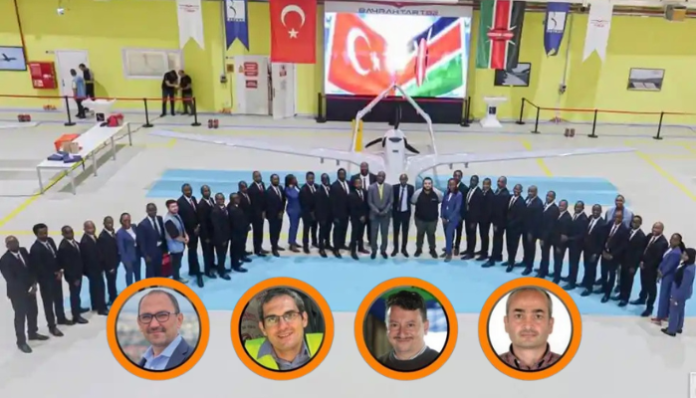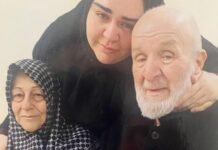Kenya’s forcible return to Turkey of four UN-protected refugees after they were kidnapped by unidentified individuals on Friday in Nairobi comes two months after the purchase of TB2 Armed UAVs produced by Baykar Makina, a Turkish company led by President Recep Tayyip Erdoğan’s son-in-law.
Kenyan Principal Secretary for Foreign Affairs Korir Sing’oei said in a statement on X on Monday that the four were repatriated to their home country on Friday at the request of Turkey.
TurDef, a Turkish news outlet, reported on August 28 that Baykar exported an undisclosed number of TB2 Armed UAVs to Kenya. “[I]t is not known how many TB2s and ground control stations Kenya has purchased,” TurDef said, referring to Baykar’s statement. “[T]rainees from Kenya graduated by completing BayraktarTB2 Armed UAV training at Baykar Flight Training Centre.”
President Erdoğan has been offering Turkish-made drones at an attractive price in exchange for the transfer of schools run by members of the faith-based Gülen movement and the abduction of people linked to the movement to Turkey.
According to research by Nordic Monitor, security cooperation agreements have also emerged as a significant mechanism used by the Turkish government in recent years to harass critics living abroad.
“Kenya confirms that four Nationals of the Republic of Türkiye were repatriated to their home country on Friday, 18 October 2024, at the request of the government of Türkiye,” the Kenyan Foreign Ministry statement said, adding that Kenya acceded to this request “on the strength of the robust historical and strategic relations anchored on bilateral instruments between our respective countries.”
The statement did not mention the names of the Turkish nationals, but they are believed to be Mustafa Genç, Hüseyin Yeşilsu, Öztürk Uzun and Alparslan Taşçı, who were among seven people abducted in Nairobi on Friday. While three of the victims, including a British citizen and a minor, were later released, four others remained missing.
The United Nations expressed concern Tuesday over the repatriation of four Turkish refugees from Kenya who rights groups say were abducted and forcibly returned in violation of international law. UNHCR, the UN refugee agency, said in a statement to AFP that it was “deeply concerned by the refoulement of four refugees from Kenya.”
In a statement condemning the Kenyan government for violating international refugee law, 20 rights group underlined that “these obligations cannot be traded for commercial, diplomatic, or trade interests without violating both national and international law.”
In May 2021 another Turkish teacher, Selahattin Gülen, was forcibly brought back to Turkey by operatives of the Turkish government in Kenya due to his relationship with the movement.
The incident has again raised concerns that the kidnappers were operating under the direction of Turkish intelligence agency MİT. The agency confirmed in its annual report for 2022 that it had conducted operations for the forcible return of more than 100 people with alleged links to the Gülen movement.
Then-vice president Fuat Oktay said in a speech in parliament that Turkish agents had conducted “diplomacy” with their counterparts in countries where Turkish nationals were abducted.
Turkish President Recep Tayyip Erdoğan has been targeting followers of the Gülen movement, inspired by the late Turkish Muslim cleric Fethullah Gülen, since the corruption investigations of December 17-25, 2013, which implicated then-prime minister Erdoğan, his family and his inner circle.
Dismissing the investigations as a Gülenist coup and conspiracy against his government, Erdoğan designated the movement as a terrorist organization and began to target its members. He intensified the crackdown on the movement following an abortive putsch on July 15, 2016 that he accused Gülen of masterminding. Gülen and the movement strongly deny involvement in the coup attempt or any terrorist activity.
The latest cases include Koray Vural, a Turkish businessman who went missing in Tajikistan in September 2023 and was found to be in police custody in Turkey the next month. Emsal Koç, who also went missing Tajikistan in June 2023, was found to be in police custody in the eastern Turkish province of Erzurum when the police contacted his family living in the province.
According to a Stockholm Center for Freedom (SCF) 2023 report on transnational repression, since the coup attempt Erdoğan’s long arm has reached tens of thousands of Turkish citizens abroad. From spying through diplomatic missions and pro-government diaspora organizations to the denial of consular services and outright intimidation and illegal renditions, the Turkish government has been using a wide range of tactics against its critics overseas.
The government’s campaign has mostly relied on renditions, in which the government and MİT persuade the relevant states to hand over individuals without due process, using various methods. The victims have suffered several human rights violations including arbitrary arrest, house raids, torture and ill-treatment during these operations.
In a joint letter in 2020 UN rapporteurs accused the Turkish government of engaging in the systematic practice of state-sponsored extraterritorial abductions and forcible returns, with at least 100 Turkish nationals renditioned from multiple states to Turkey. In several of these cases the UN Working Group on Arbitrary Detention (WGAD) concluded that the arrest, detention and forced transfer to Turkey of Turkish nationals were arbitrary and in violation of international human rights norms and standards.















